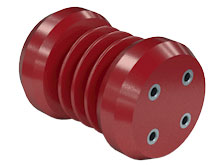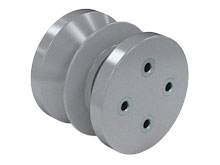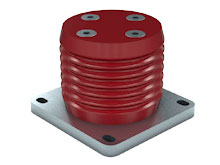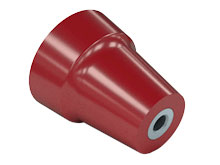Standoff (Bus Support) Insulators
What are stand-off insulators?
Stand-off insulators, also known as bus-support insulators, are a type of electrical insulator specifically designed to support and secure busbars or other electrical equipment while ensuring effective insulation distances in electrical systems. They can be used in a variety of indoor and outdoor applications such as in switchgear, transformer, and other special power apparatus, where maintaining safe distances and support between live conductors and grounded equipment is essential to prevent short circuits or flashovers.
By isolating conductors from their grounded support structures, stand-off insulators play a critical role to ensure the safety and reliability of electrical installations. They help minimize the risk of electrical discharge, equipment damage, downtime, and potential hazards to personnel working near high-voltage electrical systems.
The design of standoff insulators is critical to their effectiveness, as they must be able to withstand high mechanical and electrical stresses without breaking down or cracking. Their design and testing should comply with electrical and mechanical industry standards, including ANSI, IEEE, IEC, and NEMA.
Depending on the application, stand-off insulators are available in a range of different shapes, sizes, and materials. They are often designed with specific mounting hardware to ensure secure installation and reliable operation over time. Some of the various types of insulating materials are epoxy resins, silicon, glass, and porcelain. Polycast insulators, for both indoor and outdoor use, are manufactured from high-quality composite epoxy materials, which provide excellent mechanical strength and durability, even under harsh environmental conditions.
Stand-Off Insulator Manufacturer
Polycast is a trusted manufacturer of high-quality stand-off (bus support) insulators, offering both standard and custom designs for a wide range of indoor and outdoor applications. Our epoxy stand-off insulators deliver exceptional mechanical strength, electrical performance, and long-term durability. You can request a quote for any of the products listed above using the provided options.
We also specialize in retrofit solutions for older or non-Polycast stand-off insulator models to ensure compatibility and reliable performance. Whether you require unique sizes, shapes, or mounting configurations, our engineering team can deliver solutions tailored to your specifications. Contact Polycast to discuss your project and receive expert technical support.












